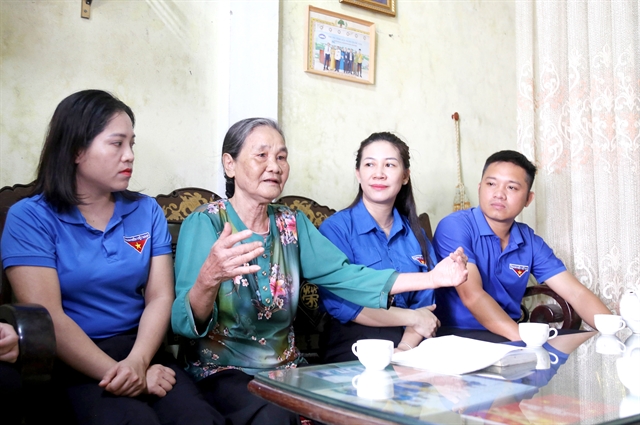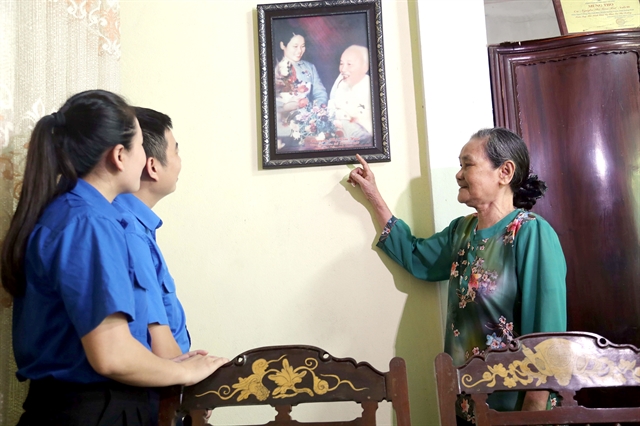 Society
Society

 |
| Labour hero Nguyễn Thị Kim Huế (second, left) talks about the honour of meeting President Hồ Chí Minh five times.— VNA/VNS Photo Tá Chuyên |
QUẢNG BÌNH — Labour hero Nguyễn Thị Kim Huế, 86, a resident of Phù Cảnh Commune, Quảng Trạch District in the coastal central province of Quảng Bình, had the extraordinary honour of meeting President Hồ Chí Minh on five separate occasions.
For her, each meeting remains an unforgettable memory.
Her first meeting with President Hồ Chí Minh took place in November 1966.
Recognised for her outstanding contributions to safeguarding the legendary Road 12, Huế was selected to attend a training course at the Youth Volunteer Political School in Hưng Yên Province.
There, after taking the shooting tests and scoring top marks in all three tests, she was granted the opportunity to meet and speak with President Hồ Chí Minh, who warmly praised her with the words: "Quảng Bình’s woman excel in production, in combat and in everything they do."
The second meeting occurred later that same year, when Huế was among a delegation from the transport sector reporting their achievements to President Hồ Chí Minh.
Noticing that she was the youngest female member of the group, Uncle Hồ gently inquired about her unit, her work her personal life and family.
When Huế replied: “I’ll only have children once the war against the Americans is over,” the President encouraged her, saying "You're a great fighter, but you also have responsibilities at home. You should have children – the struggle against the Americans is a long one."
The third meeting took place on February 1, 1967 at the National Hero Congress.
At the event, Huế was honoured with the title of Labour Hero and her unit, Unit 759, was awarded the title Hero of the People’s Armed Forces.
After personally awarding the Labour Hero medal to Huế, Uncle Hồ placed a scarf around her neck and presented her with a wristwatch.
He also reminded her: “You've known how to produce and work already, now, when you create wealth, you should also learn to save and protect it."
The fourth meeting was, according to Huế, the most emotional of her life.
It was during the Fourth National Youth Volunteer Congress in July 1967.
Together with Nguyễn Thị Mỹ, Deputy Commander of the Southern Youth Volunteer Team, she was given the honour of presenting flowers to President Hồ Chí Minh.
At that moment, a photograph was taken capturing Huế representing the Youth Volunteers as she presented flowers to Uncle Hồ.
Later, the photo was printed by Tiến Bộ Printing House into tens of thousands of copies and distributed nationwide.
Today, she still carefully preserves and proudly displays the photograph in the most prominent place at her home.
Her fifth and final meeting with President Hồ Chí Minh was on the occasion of the 50th anniversary of the Russian October Revolution.
Before departing for a visit to the Soviet Union, Huế and other delegates were invited to meet with Uncle Hồ, who offered them thoughtful guidance.
During a meal, when seeing a single grain of rice fell to the floor, the President reminded everyone about frugal living and how to appreciate the hard work of the farmers who grew the rice.
He also advised the delegates to carry themselves with dignity and confidence while abroad, showing no fear and to remain steadfast in the fight against American aggression.
Recalling the advice, when an international journalist once asked Huế: “You’re a fighter against the Americans, why are you so small? And how can such a small, poor country like Việt Nam defeat the America?”
Huế replied confidently: "I may be small, but my spirit is not. We are not afraid of Americans. If one generation sacrifices, another will rise to take its place."
Her response was later praised by President Hồ Chí Minh as intelligent and decisive.
Inspiring youth
 |
| The photo capturing Huế presenting flowers to Uncle Hồ is carefully preserved and proudly displayed in the most prominent place at her home.— VNA/VNS Photo Tá Chuyên |
Huế was a female volunteer on the Trường Sơn Road during the fierce war years.
Orphaned at a young age, at the age of 17, Huế wrote an application to join the youth volunteer force.
She was assigned as the Squad Leader of Squad 6, Unit 759, Team 75, Construction Site 12.
Her unit worked very hard all day and night to break rocks to open roads and fill bomb craters on Road 12 – which was called as the 'fire line' at that time, to ensure smooth traffic for the southern battlefield.
Road 12 - a branch of the Trường Sơn Road - was given the name because it was always fiercely bombarded by American forces in an attempt to disrupt the traffic arteries on the route.
Huế's unit established a 'suicide squad' and she was chosen as the squad leader.
Huế recalled: “At that time, there were unexploded bombs on the ground and enemy planes overhead.”
She said of her squad: “No one was afraid of hardship, only heartbroken when after each bombing, comrades had to leave forever.
“Before we went out to do our tasks on the road, we knew that death was imminent.”
She added: “Sooner or later we would all die, people only die once, and we are willing to sacrifice for the Fatherland.”
The team, thus, held a memorial service before going out to do their duty on the road, a living memorial service because they knew they could die any time.
During those fierce days, to quickly fill bomb craters for vehicles to pass, Huế had the initiative to prepare wood and bamboo from the forest and place them along the route.
After each round of enemy bombing, the whole team rushed out to clear the dirt and patch the road.
“Once, my team filled four large bomb craters in only two hours,” she said.
The life and legacy of Huế are more than historic anecdotes.
They are a source of deep inspiration, stirring a sense of patriotism and responsibility in today’s youth, encouraging them to learn from and emulate President Hồ Chí Minh’s moral example and leadership style.
Trần Thị Viễn, Deputy Secretary of commune’s Youth Union said listening to Huế recount her meetings with Uncle Hồ, she and other members felt genuinely moved and proud to remember those resilient, indomitable years of resistance against the Americans.
“Through her stories, I could sense Uncle Hồ’s deep affection and humility,” Viễn said.
Despite being a great leader, Uncle Hồ was incredibly simple and close to the people.
“While today’s younger generation live in peace and comfort, we must never forget the sacrifices made by Uncle Hồ and the heroes and martyrs who gave their lives for our independence and freedom,” she said.
Trần Xuân Nam, Deputy Secretary of the District’s Youth Union, said Huế’s stories of meeting President Hồ Chí Minh have given young people renewed motivation and determination to work hard, to serve their communities and to help build a more prosperous homeland.
In the district, Huế’s accounts of those historic meetings are regularly incorporated into extracurricular lessons and local history programmes.
Local students are encouraged to view her as a living embodiment of heroism and are instilled with a sense of national pride.
Moreover, local Youth Union and Young Pioneers’ activities often revolve around the theme 'Following Real-life Role Models', with Huế recognised as a shining example.
Local schools also organise regular writing competitions, storytelling contests and reflection activities based on her life, considering her a living witness to history whose story continues to inspire generations.
Nguyễn Đình Tuận, Head of the district’s Publicity and Education Commission, said local authorities organise regular exchanges with living witnesses to history.
The district’s youth union, Veterans Association and Education and Tranining sector invited Huế many times to speak with students and young people, sharing stories of her meetings with Uncle Hồ and her experiences in battle.
“These personal accounts help young audiences connect with history on a more emotional and human level,” he said.— VNS